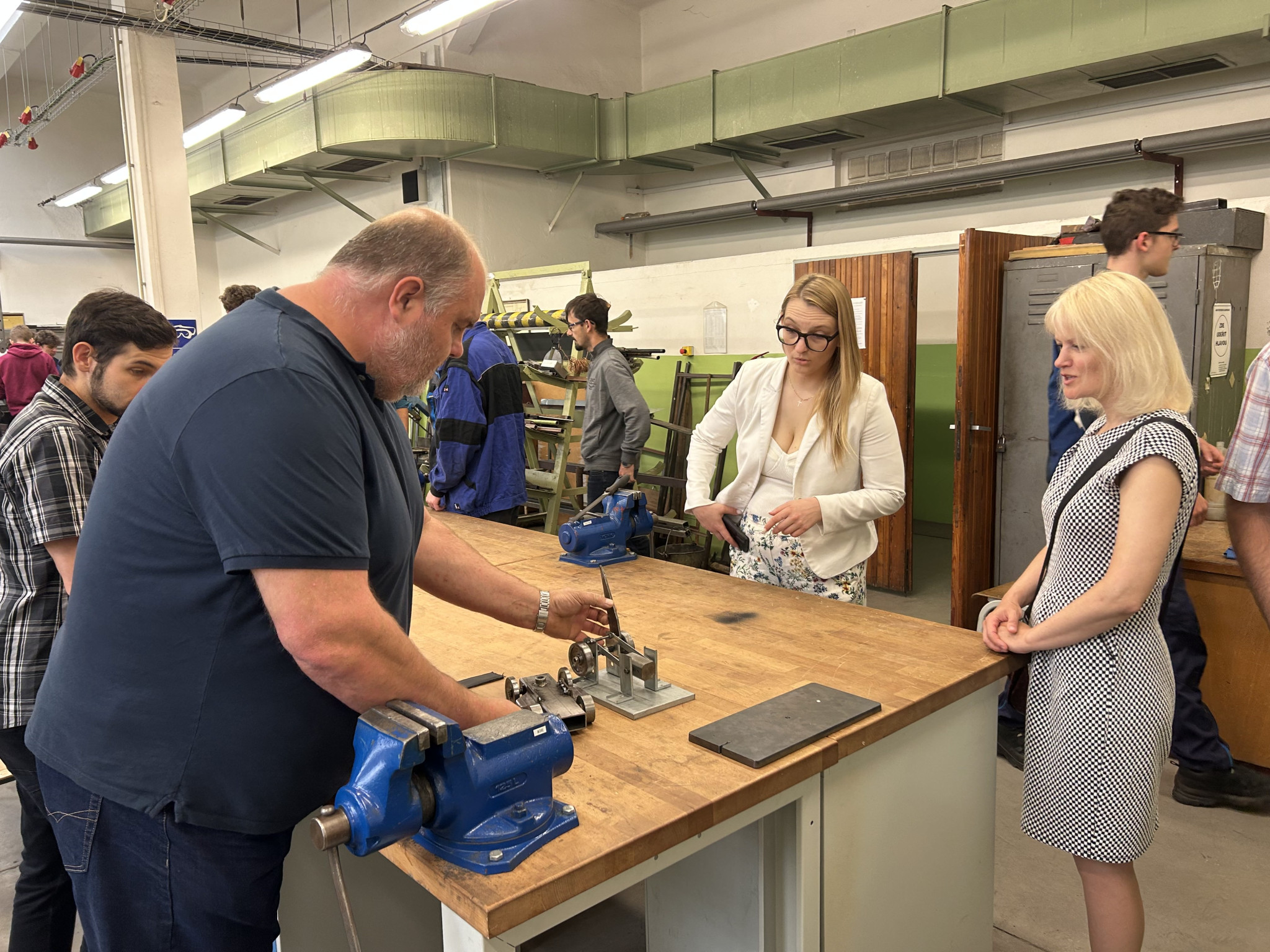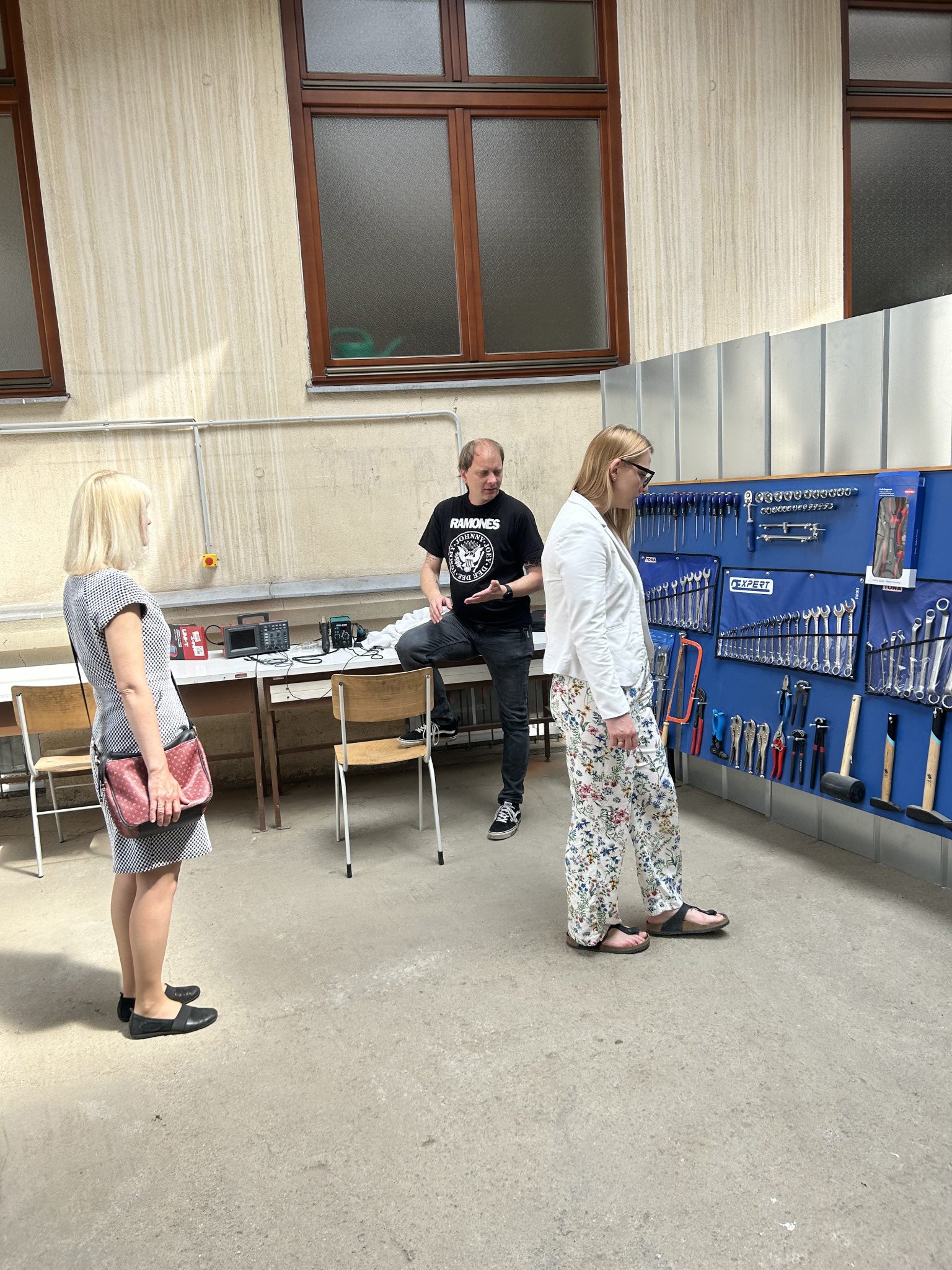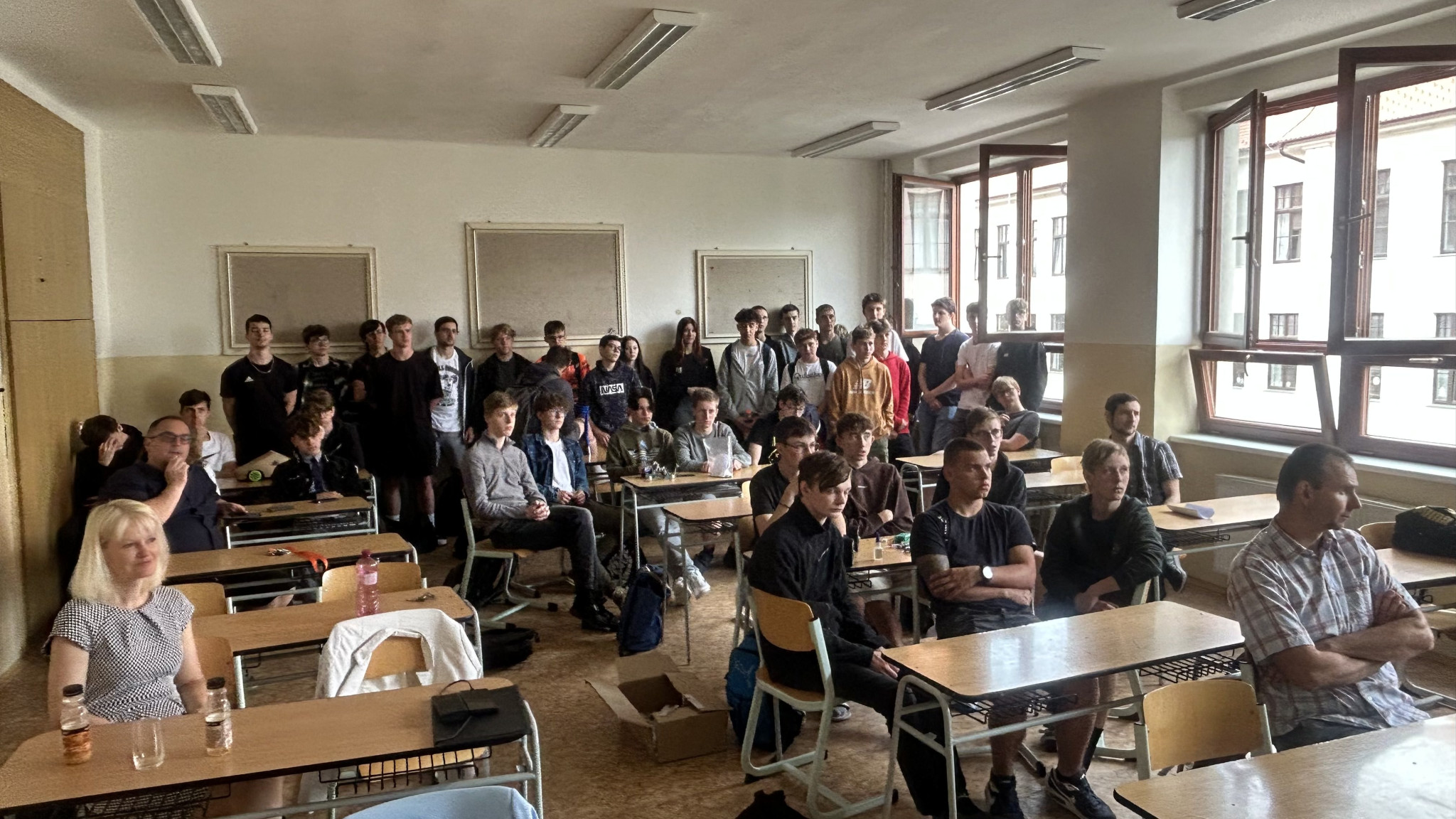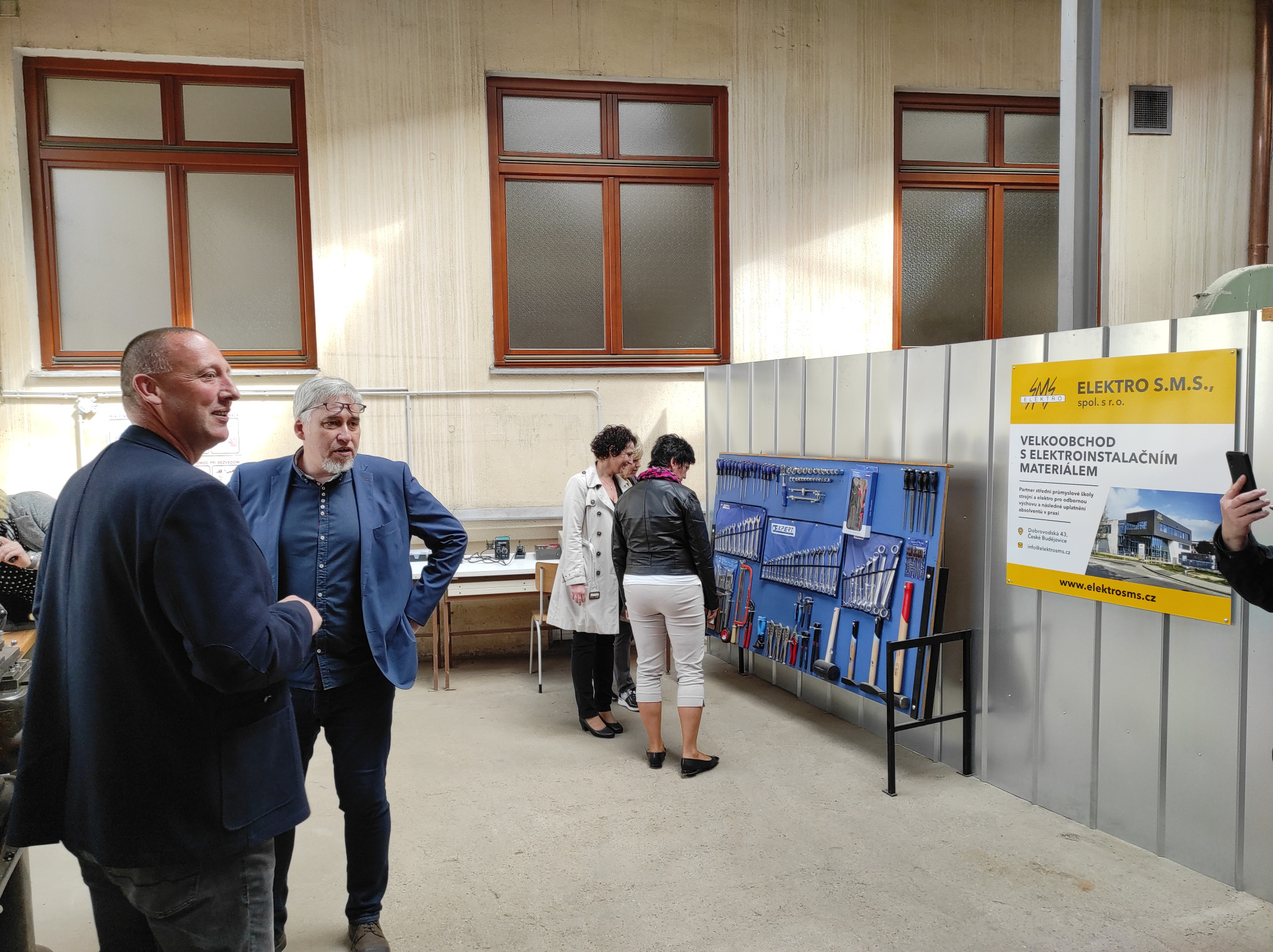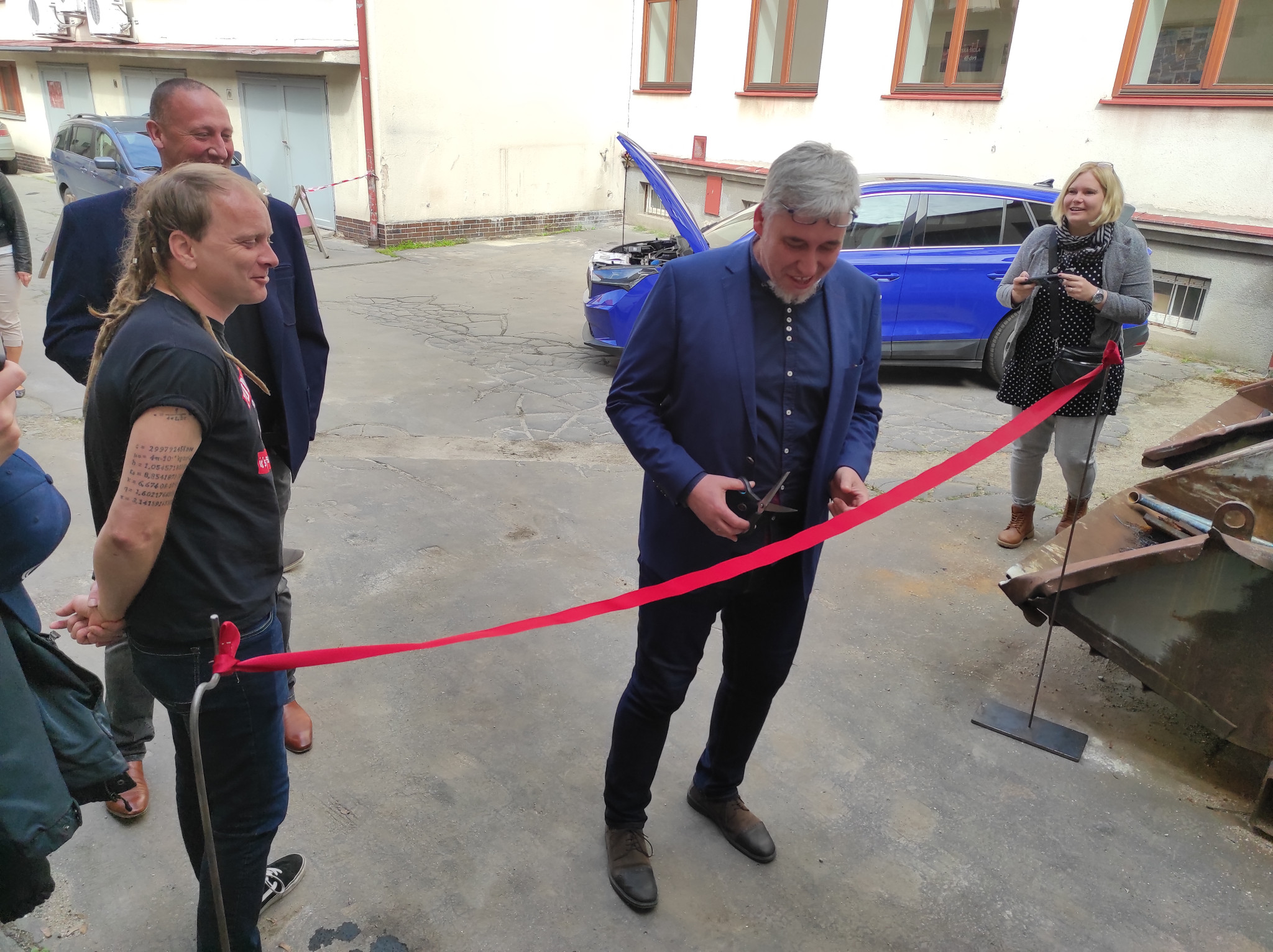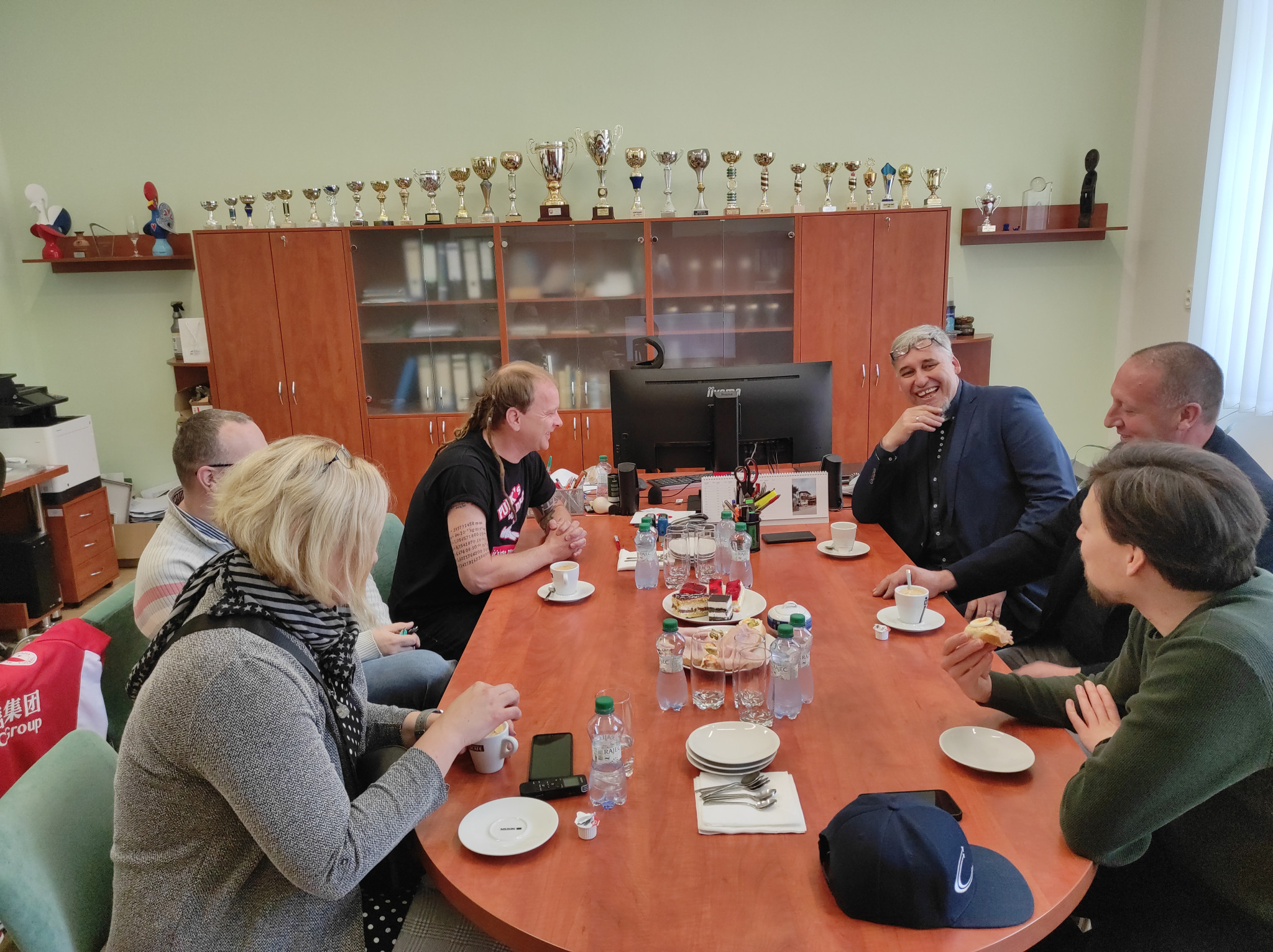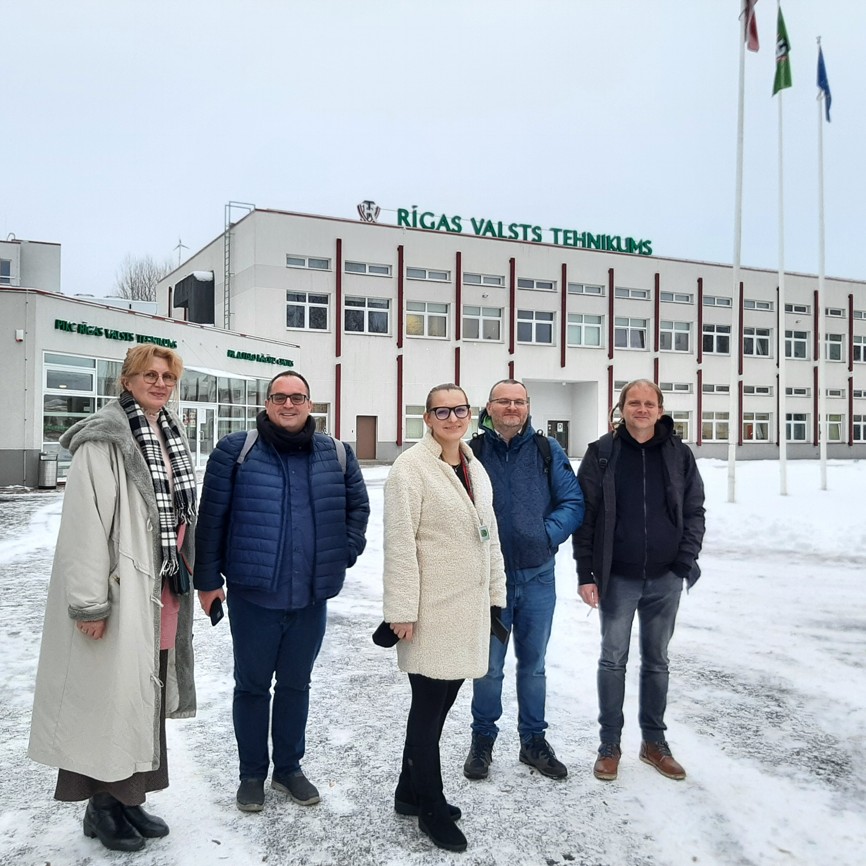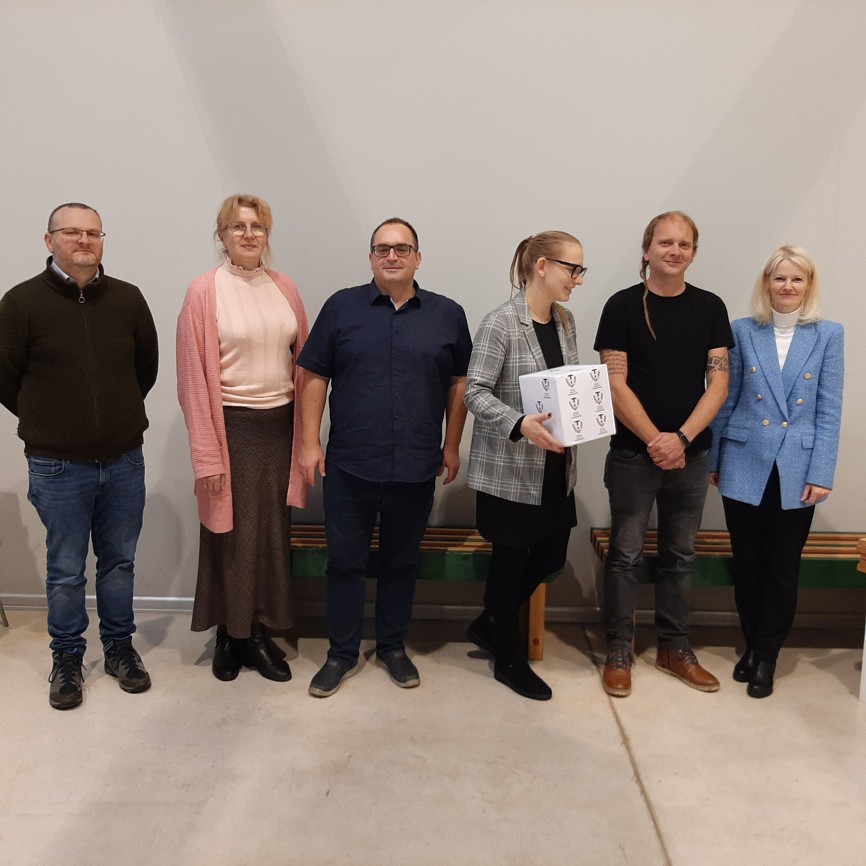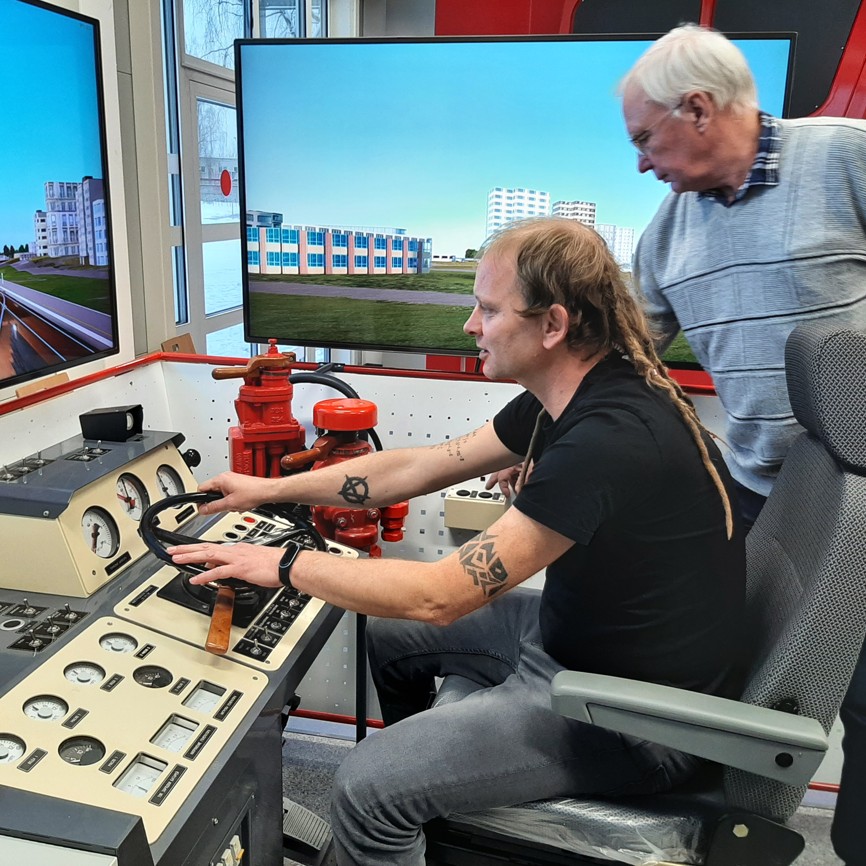February 2024 - The Electromobility Partnership project ends in February
With the end of February 2024, we are closing the chapter of our successful Erasmus cooperation, especially with our partner school in Riga, Latvia. The objectives of our cooperation have been successfully fulfilled. The WP1 working group, consisting of representatives of school management and project coordinators, successfully coordinated the whole project. Their work included ensuring the legislative aspect of the learning outcomes and comparing the standards of the education systems. They were actively involved in the media coverage of the project outputs and established cooperation with employers in the regions through roundtables. They also monitored developments in the areas of technology and employment.
Working group WP2 - Teachers of vocational subjects and foreign languages - focused on the development of electronic teaching materials for the field of Electromobility and the creation of a Dictionary of Technical English for the field of Electromobility. Student teams were actively involved in Etwinning activities and collaborating on the creation of an electric scooter and the construction of small electric vehicles, which were presented at a number of events. We even got on TV. The WP3 - IT Teachers group has focused on creating an online environment for teaching materials and providing technical support to other working groups. Its output was an online environment to host e-learning materials and preparation for a hackspace in the school, which was successfully opened to the public again in the presence of the media.
We would like to thank everyone for their active participation and contribution to the success of this project. We look forward to further cooperation and new challenges. You can find out more about the outcomes on our school website, where you can also find more information about the Erasmus projects in which our school is involved.
February 2024 - The Electromobility Partnership project ends in February
With the end of February 2024, we are closing a chapter of our successful Erasmus cooperation, in particular with our partner school in Riga, Latvia. The objectives of our cooperation have been successfully fulfilled. The WP1 working group, consisting of representatives of school management and project coordinators, successfully coordinated the whole project. Their work included ensuring the legislative aspect of the learning outcomes and comparing the standards of the education systems. They were actively involved in the media coverage of the project outputs and established cooperation with employers in the regions through roundtables. They also monitored developments in the areas of technology and employment.
WP2 - Teachers of vocational subjects and foreign languages - focused on the development of electronic teaching materials for the field of Electromobility and the creation of a Technical English Dictionary for the field of Electromobility. Student teams were actively involved in Etwinning activities and collaborating on the creation of an electric scooter and the construction of small electric vehicles, which were presented at a number of events. We even got on TV. The WP3 - IT Teachers group has focused on creating an online environment for teaching materials and providing technical support to other working groups. Its output was an online environment to host e-learning materials and preparation for a hackspace in the school, which was successfully opened to the public again in the presence of the media.
Thanks are already due to everyone for their active participation and contribution to the success of this project. We look forward to further cooperation and new challenges. You can find out more about the outcomes on our school website, where you can also find more information about the Erasmus projects our school is involved in.
During the project, students from the Secondary School of Mechanical and Electrical Engineering and Riga State Technical School participated in numerous transnational online conferences. They gained valuable experience presenting their ideas for future green vehicles and other projects to an international audience in English and also exchanged knowledge and skills related to the topics related to electric cars. The discussions also covered the advantages of electric cars. They could also showcase the created electric scooter and electric bicycle charger, explaining the basic principles of construction to an international audience. Such participation in the transnational project was a gainful experience for the students.
18.1.2024 Hackspace at Riga State Technical College opens to the public
The Hackspace serves as a coworking space for students, their parents, adult students from the Adult Education Centre, teachers and other members of the community at Riga State Technical College. The Hackspace "Coworking Space" is located in the Technology and Innovation Centre (70 Darzciema Street). The Hackspace "Coworking Space" is equipped with the necessary infrastructure to support coworking activities, including tables, chairs, 30 laptops, high-speed internet and 2 charging cabinets. In the future it will be complemented by a copier, printer and 3D printer. The Hackspace "Coworking Space" is open to the public three days a week (Tuesday, Wednesday and Thursday) from 3:00pm to 6:00pm. It is free for the public. On average, 2-3 people visit it per week. During the opening hours of the Hackspace "Coworking Space" there is one responsible person who supervises the use of the technical equipment and also helps when needed.
Hackspace "Coworking Space" fosters a sense of community between individuals working in the same space. This can lead to opportunities for networking, collaboration and knowledge sharing between youth and adults, between students and teachers, and between professionals and students. It can also be used for workshops and networking sessions to facilitate interaction between students from different departments, such as the Department of Energy and Business. In this way, students can develop some new products based on interdisciplinary competences. The Hackspace "Coworking Space" has collaborative spaces that encourage teamwork and project collaboration among members.
18.1.2024 Hackspace at Riga State Technical School
Hackspace is used as a coworking space for students, their parents, adult students from the Adult Education Center, teachers, and other members of the society at Riga State Technical School. The Hackspace "Coworking Space" is located at the Technology and Innovation Center (70 Darzciema Street). Hackspace "Coworking Space" is equipped with the necessary infrastructure to support coworking activities, including desks, chairs, 30 laptops, high-speed internet, and 2 charging cabinets. In the future, it will be supplemented with a copy machine, printer, and 3D printer. Hackspace "Coworking Space" is open to the public three days a week (Tuesday, Wednesday, and Thursday) from 3:00 p.m. to 6:00 p.m. It is free of charge for the public. In average 2-3 persons per week attend it. During the open hours of Hackspace "Coworking Space" there is one responsible person who monitors the use of technical equipment and also helps in case of need.
Hackspace "Coworking Space" fosters a sense of community among individuals working in the same space. This can lead to networking opportunities, collaboration, and knowledge sharing between youngsters and adults, between students and teachers, and between professionals and learners. It also can be used for workshops and networking sessions to facilitate interactions among students from different departments, for example, the energy and commerce department. Thus, students can develop some new products based on interdisciplinary competencies. Hackspace "Coworking Space" has collaborative spaces that encourage teamwork and project collaboration among members.
12.1.2024 Our students presented their electric scooter at an online conference
On January 12, 2024, our talented students presented their creative outputs of work on building an electric scooter. This initiative was part of the wider Electromobility project, and our students, led by colleagues Strnad and Simek, demonstrated their ability to innovate and work as a team.
The competitive nature of the e-scooter design brought a new dimension to the project. Starting with two competing teams vying for the best design, the two teams were awarded and merged after the first phase. Working together, the students then realized the construction of the scooter, not only creating an innovative technical product but also strengthening team spirit.
The uniqueness of the project lies not only in the resulting e-scooters, but also in the international cooperation with Latvian students. The Latvians presented their unique approach, where their scooter generates energy in the opposite way, building a wheel that creates energy.
The international online conference not only allowed the presentation of the results, but also provided a space for an inspiring exchange of thoughts and ideas between the two groups of students. The whole project shows how creativity and innovation can shape the future of electromobility.
We congratulate our students on their success and look forward to more inspiring projects like this.
12.1.2024 Our students presented their electric scooter at an online conference
On 12 January 2024, our talented students presented their creative outputs of work on building an electric scooter. This initiative was part of the wider Electromobility project, and our students, led by colleagues Strnad and Simek, demonstrated their ability to innovate and work as a team.
The competitive nature of the e-scooter design brought a new dimension to the project. Starting with two competing teams vying for the best design proposal, the two teams were awarded and merged after the first phase. Working together, the students then implemented the construction of the scooter, not only creating an innovative technical product but also strengthening team spirit.
The uniqueness of the project lies not only in the resulting e-scooters, but also in the international cooperation with the Latvian students. The Latvians presented their unique approach, where their scooter generates energy in the opposite way, building a wheel that creates energy.
The international online conference not only allowed the presentation of the results, but also provided a space for an inspiring exchange of thoughts and ideas between the two groups of students. The whole project shows how creativity and innovation can shape the future of electromobility.
We congratulate our students on their success and look forward to more inspiring projects like this.
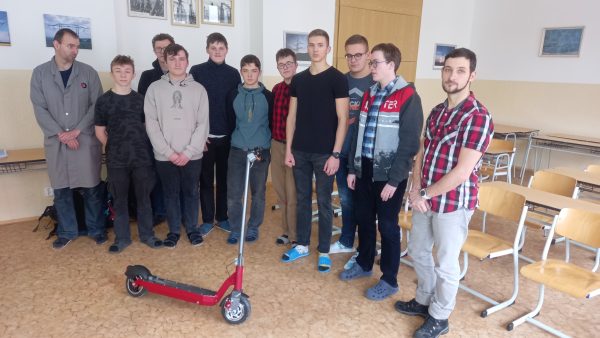
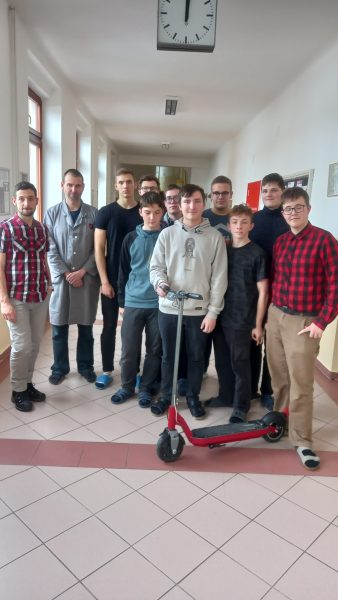
7.11.2023 Electric vehicles and hybrid technologies
As part of the Erasmus+ KA2 strategic partnership project "Future Transport, Sustainable Transport, Electromobility, Education for the Future", No. 2022-1-CZ01-KA210-VET-000082444, a "Round Table" on electric vehicles and hybrid technologies was held on 7 November 2023 at the Technology and Innovation Centre of the National Technical College in Riga. The speaker Matīss Zemītis from Moller Baltic Import, importer of Volkswagen cars in the Baltic countries and Audi cars in Latvia and Lithuania, spoke about Volkswagen and Audi electric cars. The main topics on the agenda were: 1. Why switch from ICE? 2. RAW materials - where and how do you start? 3. Life cycle analysis - the tipping point; 4. Where do batteries end up afterwards? He also informed the audience about the reduction of CO2 emissions during the production and operation of electric vehicles, etc. important aspects.
Mārtiņš Stirāns, a member of the Board of Directors of the Latvian Electric Vehicle Association, introduced the audience to the development of electric vehicles over time, including the origins of their invention, the development of charging equipment for electric vehicles, PEV/infrastructure - DC Off - Board charging, battery replacement options, different types of plugs and sockets, modern charging stations. The speaker Igor Lushov, who is a representative of Toyota Training Center, spoke about the global vision of "TOYOTA", the future of mobility will be associated with hybrid technologies and innovative electrification solutions. Various electrified technologies and fuels will contribute to sustainable mobility. The use of hybrid technologies as a way to reduce CO2 and NOx emissions. Explain the main differences between an ice-powered & mild hybrid vehicle (ICE), hybrid electric vehicle (HEV), plug-in HEV (PHEV), battery electric vehicle (BEV), fuel cell electric vehicle (FCEV) and the new generation of high performance batteries (better performance, smaller and safer, faster charging time). He reported on the TOYOTA Hybrid Synergy Drive System and its ability to select the most appropriate operating mode for each situation, from pure electric drive (for highest efficiency) to engine + motor + battery drive (for performance).
RSTS lecturer Gints Spruncis talked about the entry of electric commercial vehicles into the automotive industry and its biggest challenges. The "Round Table" was attended by automotive students and teachers. At the end of the presentations, the "Round Table" discussed electric vehicles, hybrid technology and charging options (modern charging stations).
7.11.2023 Electric Vehicles and Hybrid Technologies
In the scope of the Erasmus+ KA2 Strategic partnership project "Transport of the future, sustainable transport, electromobility, education for the future ", No. 2022-1-CZ01-KA210-VET-000082444 on 7-th November 2023 a "Rounded table" on electric cars and hybrid technologies was held at the Technology and Innovation Center of Riga State Technical School. The lecturer Matīss Zemītis from Moller Baltic Import, the importer of Volkswagen cars in the Baltic States and Audi cars in Latvia and Lithuania, talked about Volkswagen and Audi electric cars. There were the following main topics: 1. Why switch from ICE? 2. RAW materials - where and how does it start? 3. Life cycle analysis - breakeven point; 4. Where do batteries end up afterward? He also informed the audience about the reduced CO2 emissions throughout the production and operation of the electric cars etc. important aspects. Board member of the Latvian Electric Cars Association Martins Stirans informed the audience about the development of electric cars over time including the beginnings of their invention, EV charging equipment evolution, PEV/Infrastructure - DC Off - Board charging, battery swapping possibilities, different plug and socket types, modern charging stations. The lecturer Igor Lušov who is a representative of the Toyota training center talked about global vision of the company "TOYOTA", the future of mobility will be connected to hybrid technologies and innovative electrification solutions. Different electrified technologies and fuels will participate in sustainable mobility. The use of hybrid technologies as a way of CO2 and NOx reduction. He explained the main differences between Ice vehicle & Mild hybrid (ICE), Hybrid electric vehicle (HEV), Plug-in HEV (PHEV), Battery electric vehicle (BEV), fuel cell electric vehicle (FCEV) and new generation of high-performance batteries (better performance, smaller and safer, faster charging times). He informed about the TOYOTA Hybrid Synergy Drive System and it's ability to choose the most suitable operating mode for every situation, ranging from entirely electric power (for top efficiency) to engine+ motor + battery power (for performance). RSTS teacher Gints Spruncis talked about the electro-entry of commercial vehicles into the auto industry and its biggest challenges. The "Rounded table" was attended by students and teachers of the automotive department. At the end of the presentations, there were discussions at the "Round Table" about electric cars, hybrid technologies, and charging options (modern charging stations).
8. 6. 2023 Round table on electromobility
On 8 June 2023, the Round Table on Electromobility took place in the framework of the Erasmus+ programme (project name: 2022-1-CZ01-KA210-VET-000082444 Future Transport, Sustainable Transport, Electromobility, Education for the Future).
On 8 June 2023, the Round Table on Electromobility took place in the framework of the Erasmus+ programme (project name: 2022-1-CZ01-KA210-VET-000082444 Future Transport, Sustainable Transport, Electromobility, Education for the Future).
The whole event started with an introductory speech by our director (Mgr. Jaroslav Koreš, Ph.D.) and two of our teachers (Ing. Stanislav Strnad and Ing. Petr Šimek) in the school auditorium. Pupils of all the first years (1.S, 1.EE, 1.EM and 1.ER) were able to hear basic information about the field of electromobility and alternative drives, which is an interconnection of mechanical and electrical engineering. This was followed by presentations by company representatives. The speakers were Václav Vidl from Škoda Auto, a. s., Martin Klíma from E.ON Česká republika, s. r. o., Tomáš Chmelík from ČEZ, a. s., and František Pánek from Robert Bosch, spol. s r. o., who spoke about the future of electromobility.
Afterwards, the pupils of the electromobility and alternative drives (1.EM) and the representatives of the companies moved to the boardroom, where the pupils presented the results of their long-term projects. (The pupils were divided into four groups. At the end of March, they were all given a single assignment - the task was to invent and produce an electric vehicle, and they had to meet an average specified speed on a specified track, stopping accuracy over a specified distance, and adhere to a trajectory and type of drive. The pupils solved the project independently using the knowledge acquired in the vocational subjects. In the course of the work they had the opportunity to consult any problems with the teachers. The students conducted the entire presentation in English and answered additional questions from the company representatives.
In the afternoon, a meeting of representatives of companies and school management took place, where the possibilities of further employment and internships of our students in companies were discussed. The expectations of companies on the content of the study field of electromobility and alternative drives were also discussed.
Our pupils did an excellent job with the whole project and even the representatives of the individual companies praised their creations and presentation in English. The knowledge and skills of our pupils were also appreciated by regional television, which visited the Round Table on electromobility and broadcasted the event Report.
The whole event was proof that the field of electromobility and alternative drives has great potential and is the field of the future.
7.6.2023 Meeting in České Budějovice
On 7 and 8 June 2023, an international meeting was held at the "Secondary School of Mechanical and Electrical Engineering" in the Czech Republic within the Erasmus+ KA2 Strategic Partnership Project "Future Transport, Sustainable Transport, Electromobility, Education for the Future" No. 2022-1-CZ01-KA210-VET-000082444. The school's director Jaroslav Koreš together with deputy director Václav Chochol and project coordinator Tomáš Rolink welcomed the education methodologist of the Auto Department Rikards Damrozi-Sprunci and project manager Liena Ādamsone from Riga State Technical School (RSTS). During the meeting, they discussed the progress of the project work, planned activities and expected results, including considerations on the possible creation of a "Hachspace". Representatives from RSTS were given a tour of the educational institution "Secondary Industrial School of Mechanical and Electrical Engineering". The Czech students demonstrated their expertise in the field of electric vehicles by presenting toy radio controlled cars on which they demonstrated the entire design and construction cycle. Rikardas Damrozes-Sprunces' presentation featured toy radio-controlled cars made by RSTS students. Another presentation presented the result of a collaboration between teachers and students, which is a working electric bicycle with charging capability. The meeting concluded by stating that these hands-on projects offer an interesting and engaging method of deepening the knowledge of Czech students and RSTS students. In the second part of the meeting, the Czech educators Šimek, Strnad, Reitingerová, Hána, Rolínek and the Lavička workshop discussed. The project outputs such as e-learning materials and a trilingual (English, Czech and Latvian) dictionary of professional terms in the field of auto mechanics and electrical engineering were analysed. The eTwinning project was discussed within the broader scope of "Future Transport, Sustainable Transport, Electromobility, Education for the Future". Towards the end of the meeting, the project coordinator Tomáš Rolinek outlined the upcoming activities and distributed the tasks to the project partners and set a timetable for the project implementation.
7.6.2023 Meeting in Ceske Budejovice.
On June 7 and 8, 2023 was held an international meeting at the 'Medium Industry School machine a Electrical' in the Czech Republicand the scope of the Erasmus+ KA2 Strategic Partnership project "Transport of the Future, Sustainable Transport, Electromobility, Education for the Future" No. 2022-1-CZ01-KA210-VET-000082444. The director of the school, Jaroslav Koresh, along with deputy director Vaclav Chochol and project coordinator Tomas Rolinek, welcomed the educational methodologist of Auto department, Ricardo Damrozi-Sprunci, and project manager, Liena Adamsone from Riga State Technical School (RSTS). The meeting covered discussions on the progress of works within the project, planned activities, and expected results, including considerations for the potential creation of "Hachspace". Representatives from RSTS were given a tour of the educational institution 'Medium Industry School machine a Electrical.' Czech students showcased their expertise in electric cars by presenting toy radio-controlled cars, demonstrating the full design and construction cycle. In a presentation by Ricardo Damroses-Sprunces, RSTS students' toy radio-controlled cars were featured. Another presentation showcased the collaborative result of teachers and students a functional electric bicycle with charging capabilities. The meeting concluded that these practical projects offered an interesting and engaging method to enhance knowledge for both Czech and RSTS students. The second part of the meeting involved discussions with Czech educators Simek, Strnad, Reitinger, Hána, Rolinek, Reitinger, Simek, and workshops Bench. The analysis of project outcomes, such as e-learning materials and a trilingual (English, Czech, and Latvian) dictionary of professional terms in car mechanics and electrotechnics, was carried out. The eTwinning project, within the broader scope of "Transport of the Future, Sustainable Transport, Electromobility, Education for the Future" was discussed. Towards the meeting's end, project coordinator Tomas Rolinek outlined upcoming activities and assigned tasks to project partners, establishing a timeline for project execution.
28 April 2023 Opening ceremony of the hackspace
On Friday 28 April 2023 at 10:00 a.m. the first hackspace in the South Bohemia region (workshops for the general public) was opened in the woodshop of our school.
The SPŠSE Hackspace was created within the Erasmus+ programme (project name: 2022-1-CZ01-KA210-VET-000082444 Future Transport, Sustainable Transport, Electromobility, Education for the Future; support area: Erasmus+ Vocational Education and Training - Partnership for Cooperation) and it is the first hackspace in the South Bohemia Region.
Hackspace is, among other things:
- a public workshop with various equipment used for the realization of own projects,
- an inspiring space where people - both young and old - collaborate on interesting projects and share their interests,
- a centre for learning and sharing experiences.
We are aware that people have a lot of interesting ideas in their heads, but often lack the equipment needed to implement them. Thanks to the hackspace, many interesting projects will be able to emerge, both in education and leisure activities. The aim of creating a hackspace is also to increase interest in technology in general.
The biggest "draw" of our workshop is the universal spindle lathe TOS S-28. Other equipment of the hackspace includes a TOS bench drill, a two-disc bench grinder, a band saw for metal, a Narex 230 and Narex 125 angle grinder, a hot air gun, an acoustic drill, a wide range of Tona Expert hand tools, a PC set-up together with a 3D printer, a soldering station with microsolder, a hot air soldering station, a laboratory digital power supply and a multimeter. The workshop also has compressed air, 400 V and 240 V distribution. The workshop equipment will be continuously updated with new machines and equipment. The workshop will not be equipped with consumables or production material (each applicant must provide his own material).
28 April 2023 Opening ceremony of the hackspace
On Friday 28 April 2023 at 10:00 a.m., the first hackspace in the South Bohemia region (workshops for the general public) was opened in the woodshop of our school.
Hackspace SPŠSE was created within the Erasmus+ programme (project name: 2022-1-CZ01-KA210-VET-000082444 Future Transport, Sustainable Transport, Electromobility, Education for the Future; support area: Erasmus+ Vocational Education and Training - Partnership for Cooperation) and it is the first hackspace in the South Bohemian Region.
Hackspace is among others:
- a public workshop with various equipment for the implementation of own projects,
- an inspiring space where people - both young and old - collaborate on interesting projects and share their interests,
- a centre for learning and sharing experiences.
We realise that people have lots of interesting ideas in their heads, but often lack the equipment needed to implement them. Thanks to the hackspace, a number of interesting projects will be able to emerge, both in education and leisure activities. The aim of creating a hackspace is also to increase interest in technology in general.
The biggest "draw" of our workshop is the TOS S-28 universal spindle lathe. Other equipment in the hackspace includes a TOS bench drill, a double disc bench grinder, a band saw for metal, a Narex 230 and Narex 125 angle grinder, a hot air gun, an acoustic drill, a wide range of Tona Expert hand tools, a PC set-up together with a 3D printer, a soldering station with microsolder, a hot air soldering station, a laboratory digital power supply and a multimeter. The workshop also has compressed air, 400 V and 240 V distribution. The workshop equipment will be continuously updated with new machines and equipment. The workshop will not be equipped with consumables or production material (each applicant must provide his own material).
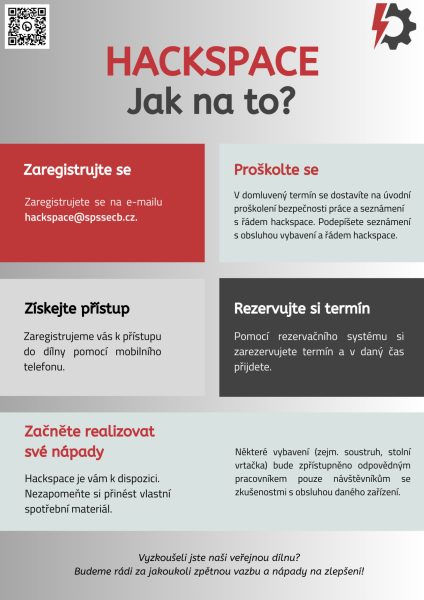
15.2.2023 Riga State Technical School creates bicycle with electricity generating function
The aim of the students and teachers was to create an electric bicycle charger with the function of generating electricity. The main task was to design a functional charging station capable of generating electricity while riding (pedaling) and thus enabling the charging of electronic devices. This project brought together students and teachers from different departments: Auto, Energy and Mechanical Engineering. The process of creating the electric bike charger was divided into three stages, with a different department responsible for each stage.
At the beginning a drawing was created (FRAME file on Google Drive).
First phase: we took an old bicycle with punctures. The car mechanics students disassembled it, welded the frame in the necessary places and the painters prepared it and painted it green. Then the mechanics students assembled it to ensure the bike functions properly.
The second stage concerned the bicycle frame. The challenge was to create a stable, visually appealing frame that could be easily adapted to different bikes. This meant that any bicycle could be placed in the frame and allow for riding (pedalling) and charging of various electrical devices. During the process, new ideas for simplifying the frame emerged, so the original concept was modified.
The third phase was the electrical part. There were several options, but the main idea was to use a car alternator and a small battery. This was the final phase of the project.
The project offers not only a fun and interactive form of learning, but also the opportunity for international cooperation and knowledge sharing.
15.2.2023 Riga State Technical School created electric bicycle charger
The aim of students and teachers was to create an electric bicycle charger with an electricity-generating function. The main challenge was to design a functional charging station capable of generating electricity while a person is riding (pedaling), allowing them to charge their electronic devices. This project combined students and teachers from different departments: Auto, Energy, and Mechanical engineering. The creation process of the electric bicycle charger was divided into three stages, for each stage was responsible different department.
At the beggining the drawing was created (google drive file FRAME).
The first stage: we took an old bicycle with defects. Auto mechanics students disassembled it, welded the frame in the necessary places, and painters prepared and painted it in green. Then, auto mechanics students assembled it to ensure the bike functions properly
The second stage was related to the bicycle frame. The task was to create a stable, visually appealing frame that could be easily adapted to different bikes. This means any bicycle could be placed in the frame, allowing for riding (pedaling) and the charging of various electric devices. During the process, new ideas emerged to simplify the frame, so the original concept have been modified.
The third stage was related to the electrical part. There were several variations, but the main idea was to use a car alternator and a small battery. This was the final stage of the project.
The project offers not only a fun and interactive form of learning, but also the opportunity for international cooperation and knowledge sharing.
10.2.2023 Building an electric scooter offers students hands-on experience in technology
Students from a Czech and Latvian school are working together on an electric scooter project to create an electrically powered vehicle. The Latvian partner of the project has recently presented its work so far and students from both schools can get inspiration and new ideas for their own development of the idea.
The electric scooter project will not only allow students to test the practical implementation of their theoretical knowledge in the field of technology, but also to learn how to work with technical software, weld or print using a 3D printer.
Each of the partners has chosen their own solution and it will be interesting to compare the results of the individual student teams. While the Latvian students, under the guidance of their teachers, have already started the implementation and their goal is to create an eco-scooter that generates energy, the Czech students will try to build a modern e-scooter. SThe actual implementation of this activity in a Czech school will start in September 2023, when preparatory work and theoretical proposals for solutions are already underway.
The project offers not only a fun and interactive form of learning, but also the opportunity for international cooperation and knowledge sharing.
10.2.2023 Building an electric scooter offers students hands-on experience in technology
Students from a Czech and a Latvian school are working together on an electric scooter project to create an electric-powered means of transport. The Latvian partner of the project has recently presented its work so far and students from both schools can get inspiration and new ideas for their own development of the idea.
The electric scooter project will not only allow students to try out the practical implementation of their theoretical knowledge in the field of technology, but also to learn how to work with technical software, weld or print using a 3D printer.
Each of the partners has chosen their own solution and it will be interesting to compare the results of the different student teams. While the Latvian students, under the guidance of their teachers, have already started the implementation and their goal is to create an eco-scooter that generates energy, the Czech students will try to build a modern e-scooter. The actual implementation of this activity at the Czech school will start in September 2023, when the preparatory work and theoretical design of the solution are already underway.
The project offers not only a fun and interactive form of learning, but also the opportunity for international cooperation and knowledge sharing.
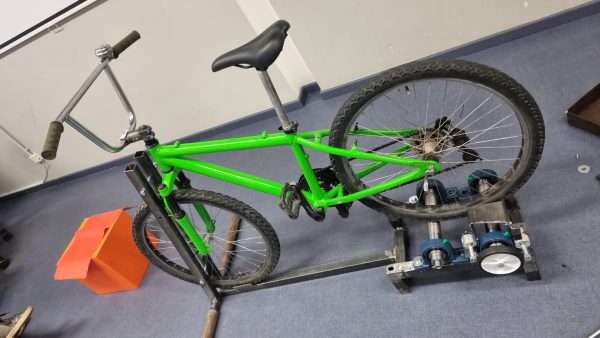
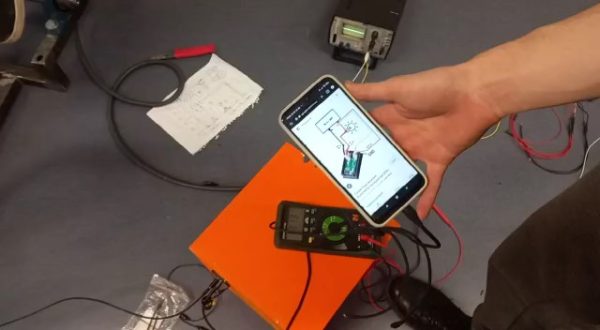
10.1. 2023 eTwinning project: the eco-friendly means of transport of the future
The E-Twinning project is beneficial for the pupils for several reasons (cooperation and teamwork, motivation and involvement, environmental awareness, technological and problem-solving skills, English language, etc.).
After prior preparation, where teachers have been working together in the past months to prepare topics and materials and working with students in the classroom, the teachers and students of both schools are participating in an online etwinning activity on the topic of green transport of the future. The students were divided into groups to present their individual and team visions of the transport vehicle of the future. The aim of this project is to create a communication environment between the students of both schools through the eTwinning platform and Twinspace, in which the students will communicate in English and use their knowledge of technical drawing.
At the final online conference, students will present their final visions to each other. The aim of this project is not only to develop ecological thinking, but also to foster friendships and develop English language skills.
The eTwinning project is an excellent opportunity for students to gain new experiences and develop their communication, collaboration and creative thinking skills while working on a common topic with peers from another country.
10.1. 2023 The eTwinning project: eco-friendly means of transport for the future
E-Twinning project is beneficial for students for several reasons (collaboration and teamwork, motivation, and engagement, awareness of environment protection, technology skills and problem solving, English language etc.)
After prior preparation, where teachers have worked together over the past months to develop topics and materials and worked with students in the classroom, the teachers and students at both schools are now participating in an online etwinning activity on the theme of the green transport of the future. The students were divided into groups to present their individual and team visions of the transport vehicle of the future. The aim of this project is to create a communication environment between the students of both schools through the eTwinning platform and Twinspace, in which the students will communicate in English and use their knowledge of technical drawing.
At the final online conference, the students will present their final visions to each other. The aim of this project is not only to develop ecological thinking, but also to foster friendships and develop English language skills.
The eTwinning project is an excellent opportunity for students to gain new experiences and develop their communication, collaboration and creative thinking skills while working on a common theme with peers from another country.
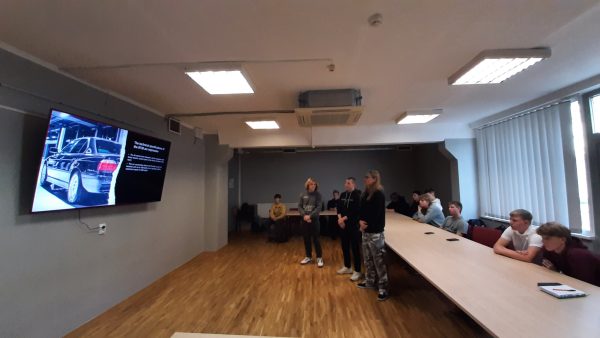
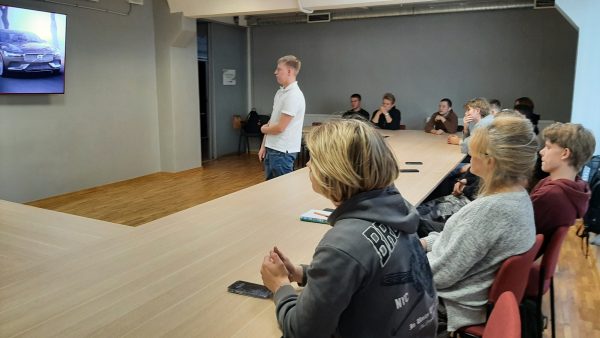
9.12.2022 Regular project team meetings: the key to the success of the Electromobility project
The Electromobility Project Teams meet regularly every 14 days to discuss topics relevant to the delivery of the project tasks. For example, the eTwinning activity on the Future Transport Vehicle, on which students and teachers are working together, is the focus of each topic. Another important topic is the creation of a technical Czech-English-Latvian dictionary for the field of electromobility, the development of educational electronic materials, the construction of an electric scooter and the development of a small electric vehicle model.
Regular project team meetings are key to the success of the Electromobility project. Discussions and collaboration between team members allow to monitor the progress of the project and respond to potential problems and challenges. In addition, they allow team members to bring new ideas and approaches to help the team achieve its goals.
The results of the regular meetings are evident throughout the Electromobility project. The project teams are able to deliver the tasks on time and with the necessary quality. The materials and products developed are innovative and in line with current trends in the field of electromobility. Regular project team meetings are therefore a key part of the successful progress of the Electromobility project.
9.12.2022 Regular project team meetings: the key to the success of the Electromobility project
The project teams of the Electromobility project meet regularly every 14 days to discuss topics that are relevant to the completion of the project tasks. For example, the eTwinning activity on the Future Transport Vehicle, on which students and teachers are working together, is the focus of each topic. Another important topic is the creation of a technical Czech-English-Latvian dictionary for the field of electromobility, the development of educational electronic materials, the construction of an electric scooter and the development of a small electric vehicle model.
Regular project team meetings are key to the success of the Electromobility project. Discussions and collaboration between team members allow to monitor the progress of the project and respond to any problems and challenges. In addition, they allow team members to bring new ideas and approaches to help the team achieve its goals.
The results of regular meetings are evident throughout the Electromobility project. The project teams are able to perform the tasks set out in a timely manner and with the necessary quality. The materials and products developed are innovative and respond to current trends in the field of electromobility. Regular project team meetings are therefore a key part of the successful progress of the Electromobility project.
22.11.2022 Erasmus+ project Electromobility: working visit to partner school in Riga
As part of our Erasmus Electromobility project, we took part in a working visit and meeting with a partner school in Riga, Latvia, on 22 November 2022. The transnational meeting of the project partners took place at the RSTS Technology and Innovation Centre. The visit was attended by our school principal Mr. Koreš, deputy principal Mr. Chochol and project manager Mr. Rolínek. Riga State Technical School (RSTS) was represented by the Education Methodologist of the Auto p.i. department. Rikarda Damroze-Sprunce, teacher of the Energy Department Sandis Breiers, English teacher Alla Zhuchenko, Head of IT Department Normunds Pauders and Project Manager Liena Ādamsone.
During this visit, we got to know our partner's project team and the equipment of their school. During the meeting, Jaroslav Koreš and Tomáš Rolínek from the "Secondary Industrial School of Mechanical and Electrical Engineering" presented us the goal, main tasks, deadlines and results to be achieved during the project. They discussed the method and timetable for the development of the project results. The possible creation of "Hachspace", its objectives, target group and expected benefits for the whole society were also discussed.
We also discussed further possibilities of cooperation between our schools and the possibilities of using individual subjects to integrate electromobility into our educational process. This cooperation will allow us to exchange experiences and new knowledge that can lead to innovations in our education system.
We look forward to further cooperation with our partners in Riga and believe that this exchange of experience will bring positive results for both our schools.
The programme of the meeting is available for preview here.
22.11.2022 Erasmus+ project Electromobility: working visit to partner school in Riga
In the framework of our Erasmus project Electromobility, we took part in a working visit and meeting with our partner school in Riga, Latvia on 22 November 2022. The transnational project partner meeting was held at the Technology and Innovation Center of RSTS. This visit was attended by our school principal, Mr. Koreš, deputy principal, Mr. Chochol, and project manager, Mr. Rolinek. Riga State Technical School (RSTS) was represented by the educational methodologist of the Auto Department p.i. Rikarda Damroze-Sprunce, teacher of the Energetic department Sandis Breiers, English language teacher Alla Zhuchenko, head of IT department Normunds Pauders and project manager Liena Ādamsone.
During this visit we got acquainted with our partner's project team and the facilities of their school. During the meeting, Jaroslav Koreš and Tomas Roline from "Střední průmyslova škola strojní a elektrotechnická" presented the goal, the main tasks, deadlines of tasks, and the project results to be achieved during the project. They discussed the way and timeline of the development of the project results. There were also discussions about the potential creation of 'Hachspace,' its goals, the target audience, and the expected benefits for society as a whole.
We also discussed further possibilities of cooperation between our schools and the possibilities of using individual subjects in the involvement of Electromobility in our educational process. This cooperation will allow us to exchange experiences and new knowledge that can lead to innovations in our education system.
We look forward to further cooperation with our partners in Riga and believe that this exchange of experience will bring positive results for both our schools.
1. 9. 2022 Electromobility project takes off
On 1.9.2022 we started the Erasmus+ project Electromobility in cooperation with our Latvian partner, the Secondary Technical School of Riga, at our school SPŠ Strojní a elektrotechnické v Českých Budějovicích. This project focuses on the creation of teaching materials, the implementation of the Etwinning project, the creation of a dictionary for Czech, English and Latvian, as well as the introduction of a hackspace in our school for the general public. The project also includes a competition for the construction of electric scooters and small model wheelchairs. We are thrilled to be involved in this initiative and to provide our students with the opportunity to participate in such an important event. This project will allow us to expand our knowledge in the field of electric mobility and gain new experiences in the field of education. We are confident that our collaboration will be successful and bring positive results for our students and our school.
We would also like to thank our partner from Riga for their participation in this project. Together with them we have prepared an extensive plan of activities that will give our students practical experience and new knowledge in the field of electromobility. During the project we will focus on the use of renewable energy and sustainable mobility. We believe that this initiative will contribute to the environmental and economic development of the region and help our students and future generations prepare for future challenges and opportunities in the field of electromobility. We are full of enthusiasm and expect this project to be a great success.
From the previous discussions between the representatives of the two partner schools, which took place in Aj, a work procedure was established and working groups were arranged to work on the individual topics in order to achieve the set planned outcomes: the working groups (WP) are:
WP1 - Representatives of school management and project coordinators - the task of this working group is to coordinate the whole project, to ensure the legislative aspect of educational outputs to be in line with the educational standards of individual countries, to prepare other partner projects, to ensure the media coverage of the project outputs. Active cooperation with employers in the regions, monitoring developments in the fields of technology and employment. Cooperation with partner universities.
Output: networking of partner schools, preparation of Erasmus mobility project for students and staff
WP2 - Teachers of vocational subjects and foreign languages of both schools and student teams - the main focus is to compare the standards of educational systems, the creation of the content of electronic teaching materials for the field of Electromobility, the group will also include student teams that will participate in the creation of teaching material; another focus is the creation of an ebook Dictionary of Technical Aj for the field of Electromobility, another topic is a comparison of the system of preparation for the Cambridge exams, when the lead school is a partner of the British Centre. Furthermore, the implementation of specific school projects - the creation of an electric scooter and possibly a subsequent inter-school international competition in the above projects, with the involvement of student teams.
Output: e-learning materials (CZE and Latvian); Ebook Dictionary of technical I for the field of Electromobility (version in ENG, CZE and Latvian); Etwinning project Green technology school of the future or Green Technology Vehicle; school projects, competitions.
WP3 - Teaching IT of both schools - the task is to create an online environment for teaching materials, technical assistance to other WP
Output: creation of an online environment for hosting e-learning materials and preparation for a hackspace in the school.
---------------------------
Start of the project
Implementation takes place from 1 September 2022.
The implementation of the Erasmus+ (KA2) Small Scale Partnership in Vocational Education and Training project "Transport of the Future, Sustainable Transport, Electromobility, Education for the Future", No. 2022-1-CZ01-KA210-VET-000082444 in cooperation between the Secondary School of Mechanical and Electrical Engineering in České Budějovice and the State Technical School in Riga, Latvia is beneficial for both schools.
After mutual consultation between the two partner schools, the objectives and outputs were set in line with the main priorities of the project. These are:
- In cooperation with a foreign partner, create digital teaching materials for the electromobility education programme. The materials will also be usable in other EU regions and can be used by other schools in secondary education.
- Creation of educational programmes (curricula, thematic plans) on electromobility in cooperation with tertiary education (partner universities in the Czech Republic and Latvia) and partner companies.
- Linking the two partner schools in the preparation of an Erasmus+ project for student and staff mobility.
- Active cooperation with employers in the regions, monitoring developments in technology and employment. Cooperation with partner universities.
- Creation of an e-book Dictionary of technical English for the field of electromobility.
- Comparison of the English language exam preparation system.
- The implementation of specific school projects (e.g. the creation of an electric scooter) and, where appropriate, subsequent inter-school international competitions in these projects involving student teams.
- Preparation of the Green Technology School of the Future and Green Technology Vehicle projects in the e-Twinning environment.
- Creation of an online environment for the placement of e-learning materials.
- Preparing for the creation of a hackspace at school.
The realization of the project Erasmus+ program (KA2) Small-scale partnerships in vocational education and training project "Transport of the future, sustainable transport, electromobility, education for the future", No. 2022-1-CZ01-KA210-VET-000082444 in cooperation between the Secondary School of Mechanical and Electrical Engineering in Ceske Budejovice and Riga State Technical School in Latvia, is beneficial for both schools.
Implementation takes place from 1 September 2022.
After mutual consultation between the two partner schools, the objectives and deliverables were set in line with the main priorities of the project. These are:
- To develop digital teaching materials for the electromobility curriculum in cooperation with the foreign partner. The materials will also be usable within other EU regions and will be available to other schools in secondary education.
- Creation of educational programmes (curricula, thematic plans) with electromobility issues in cooperation with tertiary education (partner universities in the Czech Republic and Latvia) and partner companies.
- Linking the two partner schools in the preparation of Erasmus+ student and staff mobility project.
- Active cooperation with employers in the regions, monitoring developments in the fields of technology and employment. Cooperation with partner HEIs.
- Creation of an e-book Dictionary of technical English for the field of electromobility.
- Comparison of the English language exam preparation system.
- Implementation of specific school projects (e.g. creation of an electric scooter) and possibly subsequent inter-school international competitions in these projects involving student teams.
- Preparation of Green Technology School of the Future and Green Technology Vehicle projects in an e-Twinning environment.
- Creation of an online environment for the placement of e-learning materials.
- Preparation for the creation of a hackspace in the school.

